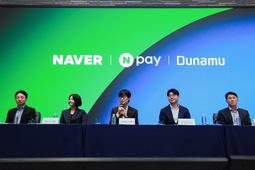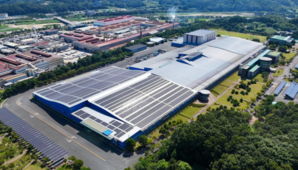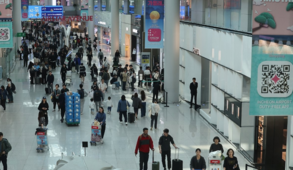
[News Space=Reporter seungwon lee] Dyson Magic, which has monopolized the Korean small home appliance market as the undisputed No. 1 in the home appliance industry, is also losing its power in Korea. In addition, the debt ratio of 350%, current liabilities reaching 18.8 times the capital, and retained earnings of only 28% of the debt, show financial vulnerability.
It is regrettable that even in such a vulnerable financial situation, 19 billion won, which is more than net profit, was paid out as dividends to the parent company.
Dyson Korea Ltd. (CEO Robert John Julian Webster) is the Korean branch of the British home appliance company Dyson. It was established in April 2017 and has been distributing and selling products in the domestic market based in Gangnam-gu, Seoul. Dyson Home Technologies Pte. Ltd. holds 100% of the shares.
According to the audit report of the Financial Supervisory Service's electronic disclosure system on the 11th, Dyson Korea's sales in 2024 decreased by 30.8% from the previous year (KRW 794.2 billion) to KRW 549.2 billion. This appears to be due to sluggish sales of major product groups and intensifying market competition.
Operating profit also fell 31% year-on-year to KRW 16.9 billion (KRW 24.5 billion), while operating profit margin remained at 3.1%, the same level as the previous year's 3.1%.
Net income also decreased. It recorded 13.2 billion won, down 26.3% from the previous year (17.9 billion won). The decrease in corporate tax expenses from 6.2 billion won to 3.5 billion won served as a buffer.
Dyson Korea's sales increased rapidly from KRW 294.2 billion in 2020 during the COVID-19 pandemic to KRW 385.8 billion in 2021 and KRW 674 billion in 2022, and continued to soar to KRW 794.2 billion in 2023 during the endemic era.
While most foreign companies in the home appliance sector that entered the Korean market had a difficult time due to poor performance, Dyson is selling like hotcakes in the Korean market, and among the top 10 home appliance companies, Dyson Korea ranked first in sales, operating profit, net profit, operating profit ratio, and dividends paid by the head office in 2023, sweeping all sectors.
Despite the poor performance, the company continued its high-dividend policy. 19 billion won was paid out as dividends for 2024, and the dividend per share was 21,111 won (dividend rate 2,111.1%). The dividend payout ratio for 2024 also reached 143.6%.
This means that Dyson Korea paid out more (KRW 19 billion) in dividends than its net income (KRW 13.2 billion). Dyson has paid out KRW 59 billion in dividends in 2022 and KRW 15 billion in 2023.
Looking at the main cost structure, selling and administrative expenses decreased by 22.5% year-on-year to KRW 158.2 billion. In detail, there was an overall decrease in major items such as advertising and publicity expenses of KRW 56.5 billion (KRW 76.4 billion in the previous year), salary expenses of KRW 21.1 billion (KRW 19.2 billion in the previous year), and commissions paid of KRW 50.3 billion (KRW 82.3 billion in the previous year).
The amount of inventory purchased with parent company Dyson Technology Ltd. decreased by 18.1% to KRW 444 billion from KRW 542 billion the previous year. This accounted for 99.4% of the total purchased inventory, showing that the company maintains a high level of dependence on its parent company.
The decrease in inventory purchases is related to a decline in sales, which is seen as a sign that Dyson Korea is experiencing sluggish product sales in the domestic market.
In addition, the amount of return and quality assurance cost reserves was calculated to be KRW 14.9 billion, which is a decrease of approximately 31.9% compared to the previous year (KRW 21.9 billion). These costs are the amount of support received from the parent company to resolve consumer returns and product quality issues.
Also, the debt ratio slightly worsened to 348.5% compared to 344.1% the previous year. Current liabilities are 169 billion won, which is 18.8 times the capital (900 million won). Inventory assets also increased by 116.9% year-on-year to 127.7 billion won, which is acting as a factor in the pressure on liquidity.
The current ratio improved to 126% from 124% the previous year, but liquidity risk remains as the ratio of cash assets (KRW 11.4 billion) to short-term borrowings stands at 6.8%.
Retained earnings increased by 39% to KRW 47.6 billion from KRW 34.3 billion the previous year, and undistributed retained earnings as of the end of 2024 will be KRW 28.1 billion. However, retained earnings are only 28% of the debt size (KRW 169 billion), so there is a limit to repaying debt with retained earnings alone.
A corporate finance analysis expert pointed out, "The debt ratio is significantly higher than the industry average of 200%. In particular, current liabilities amount to 18.8 times the capital, so there is a lot of pressure to repay in the short term." He added, "The current ratio has improved, but actual liquidity is weak."
There are also risk factors. Two lawsuits worth 64 million won are pending in court. In addition, there are 2.6 billion won in outstanding foreign currency receivables and 89 million won in foreign currency debt, so there is a possibility of losses due to exchange rate fluctuations.
A corporate finance analysis expert said, "Dyson Korea has a business structure that is closely linked to the parent company, as revealed in special related party transactions, quality assurance costs, and dividends." He added, "This suggests that strengthening cooperation with the parent company is essential, but at the same time, it exposes vulnerabilities in terms of independent business expansion and risk management."
He continued, "Along with financial measures such as debt repayment and liquidity improvement, a sales recovery strategy through new product launches and strengthening online channels is urgent," and emphasized, "In the future, recovery of market demand and improvement of product quality are expected to play an important role in increasing sales and reducing costs."
Currently, home appliance companies such as Dyson (UK), Philips (Netherlands), Electrolux (Sweden), Delonghi (Italy), Liebherr (Germany), Molecule (USA), SharkNinja (USA), Blueair (Sweden), Smeg (Italy), Braun (Germany), Laurastar (Switzerland), Nova Virus (Ireland), Bissell (USA), and SharkNinja (USA) are selling their products in Korea. Many of these home appliance companies are from soccer powerhouses, so they are fiercely competing for the Korean market, as if it were the 'World Cup.'
























































